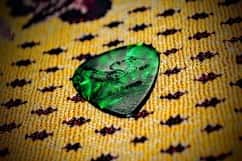Popular Tutorials
The latest four guitar tabs
How To Protect Your Guitar Strings From Rusting
A Beginner’s Guide to Extend the Life of the Strings
It's frustrating when you invest your time and energy into changing your guitar strings, only for the new ones to begin rusting just a few weeks later. Whether you play a 12-string acoustic, solid-body electric or electric-acoustic hybrid, you'll need to keep an eye on the strings. Aside from the poor sound quality, guitar strings are more likely to break if they are rusted.
My Strings
Why Guitar Strings Rust
The first step to protecting your guitar strings from rusting is to understand why this phenomenon happens. Like all iron-containing metallic objects, guitar strings corrode when exposed to moisture. Even in small amounts, moisture triggers a chemical reaction, known as oxidation, which converts iron into a new, weaker metal: rust. Because of this reaction, the once-strong strings become easier to break.
Don't assume your guitar strings are rust-proof just because they are steel, bronze, copper or another metal. Iron is the world's second-most abundant mineral, and it's everywhere, even inside your blood. Iron is also inside found in many metals, including those used to make guitar strings.
The first step to protecting your guitar strings from rusting is to understand why this phenomenon happens. Like all iron-containing metallic objects, guitar strings corrode when exposed to moisture. Even in small amounts, moisture triggers a chemical reaction, known as oxidation, which converts iron into a new, weaker metal: rust. Because of this reaction, the once-strong strings become easier to break.
Don't assume your guitar strings are rust-proof just because they are steel, bronze, copper or another metal. Iron is the world's second-most abundant mineral, and it's everywhere, even inside your blood. Iron is also inside found in many metals, including those used to make guitar strings.
Humidity Control
To discourage your guitar strings from rusting, you should monitor and control the humidity of the area in which you store your guitar. Humidity is a measurement of moisture vapor in the air. High humidity means the air is holding a significant amount of moisture. As a result, the excess moisture encourages rust to form on iron-containing metals like guitar strings.
Ideally, you should maintain a 40% to 50% relative humidity level in the room or area where you store your guitar. That ensures the air isn't overly saturated to the point where it causes your strings to rust, but also not too dry to the point where it damages your guitar's body (low humidity can cause wooden guitars to crack).
Wash Your Hands Before Playing
Try to get into the habit of washing your hands before playing the guitar. You may not realize it, but your fingers and palms contain moisture and oils that can damage your guitar strings. While sweat is mostly water, it also includes salt, sugar, and salt. This unique composition speeds up the rate at which guitar strings rust.
Washing your hands before playing will remove any lingering swear and oils, preventing them from transferring over to your guitar strings.
Clean Your Strings
Another way to protect against rusting is to clean your guitar strings after playing. Using a lint-free microfiber cloth, gently wipe down your strings. This method isn't going to remove much visible dirt or debris, but it will remove moisture -- and that's why it's an efficient way to protect your strings from rusting.
Anti-Rust-Coated Strings
Finally, consider using guitar strings coated with an anti-rust chemical or compound. Elixir, known for their rust-proof strings, feature a patented coating that protects against corrosion and extends the life of the strings. Other strings are produced with a chromium coating, which also protects against corrosion.
Here is a selection of coated guitar strings
Even if you follow all of these tips and keep your guitar strings meticulously dry, they may still rust after a certain amount of time. Assuming the rust is minor, you can usually clean it with alcohol. Once it's become severe, though, you'll need to invest in new strings.
To discourage your guitar strings from rusting, you should monitor and control the humidity of the area in which you store your guitar. Humidity is a measurement of moisture vapor in the air. High humidity means the air is holding a significant amount of moisture. As a result, the excess moisture encourages rust to form on iron-containing metals like guitar strings.
Ideally, you should maintain a 40% to 50% relative humidity level in the room or area where you store your guitar. That ensures the air isn't overly saturated to the point where it causes your strings to rust, but also not too dry to the point where it damages your guitar's body (low humidity can cause wooden guitars to crack).
Wash Your Hands Before Playing
Try to get into the habit of washing your hands before playing the guitar. You may not realize it, but your fingers and palms contain moisture and oils that can damage your guitar strings. While sweat is mostly water, it also includes salt, sugar, and salt. This unique composition speeds up the rate at which guitar strings rust.
Washing your hands before playing will remove any lingering swear and oils, preventing them from transferring over to your guitar strings.
Clean Your Strings
Another way to protect against rusting is to clean your guitar strings after playing. Using a lint-free microfiber cloth, gently wipe down your strings. This method isn't going to remove much visible dirt or debris, but it will remove moisture -- and that's why it's an efficient way to protect your strings from rusting.
Anti-Rust-Coated Strings
Finally, consider using guitar strings coated with an anti-rust chemical or compound. Elixir, known for their rust-proof strings, feature a patented coating that protects against corrosion and extends the life of the strings. Other strings are produced with a chromium coating, which also protects against corrosion.
Here is a selection of coated guitar strings
Even if you follow all of these tips and keep your guitar strings meticulously dry, they may still rust after a certain amount of time. Assuming the rust is minor, you can usually clean it with alcohol. Once it's become severe, though, you'll need to invest in new strings.
Free Guitar Tabs
GuitarNick.com
Copyright © 2009-2025
Nicola Mandorino. All rights reserved
VAT: IT 02937060735
Nicola Mandorino. All rights reserved
VAT: IT 02937060735






















